Dirty Habits, Deadly Consequences: The Fight for Public Health
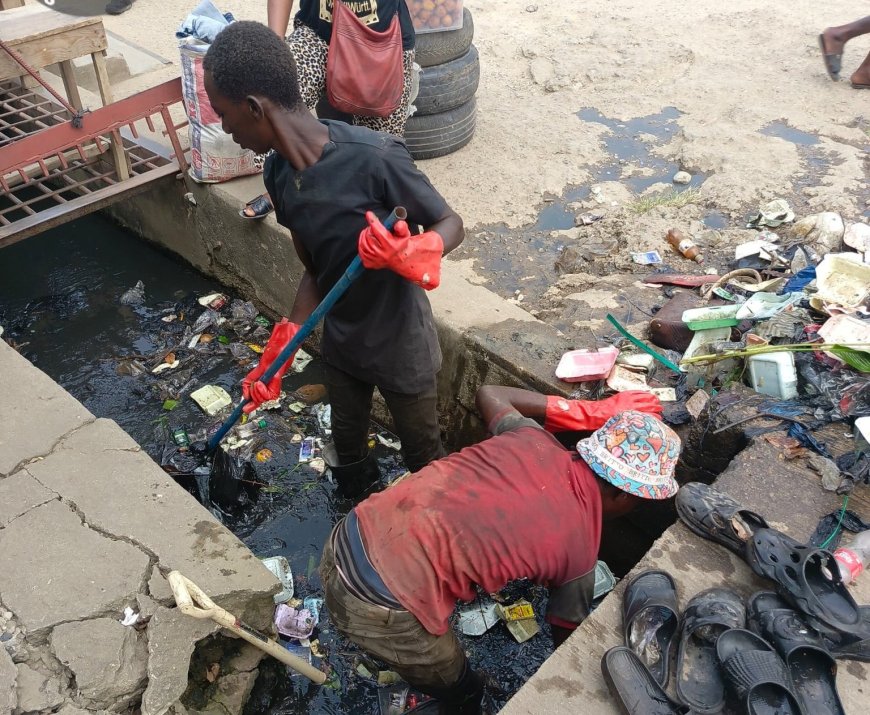
Lagos, Nigeria - 09 Jan, 2025 - Hygiene is often described as the cornerstone of health, and for good reason. Across the globe, maintaining proper hygiene has been proven to prevent illnesses, improve well-being, and even save lives.
Good hygiene practices are essential for breaking the chain of infection. Regular handwashing, for instance, is a simple yet effective way to reduce the risk of contracting common illnesses such as colds, flu, and gastrointestinal infections.
As Nigeria’s economic hub and one of Africa’s fastest-growing cities, Lagos faces unique challenges in promoting hygiene. In Lagos, hygiene is more than a personal habit; it is a matter of public health survival. Yet, in a city of about 20 million people, where urbanization has outpaced infrastructure development, poor hygiene practices and inadequate sanitation systems have become silent enablers of preventable diseases.
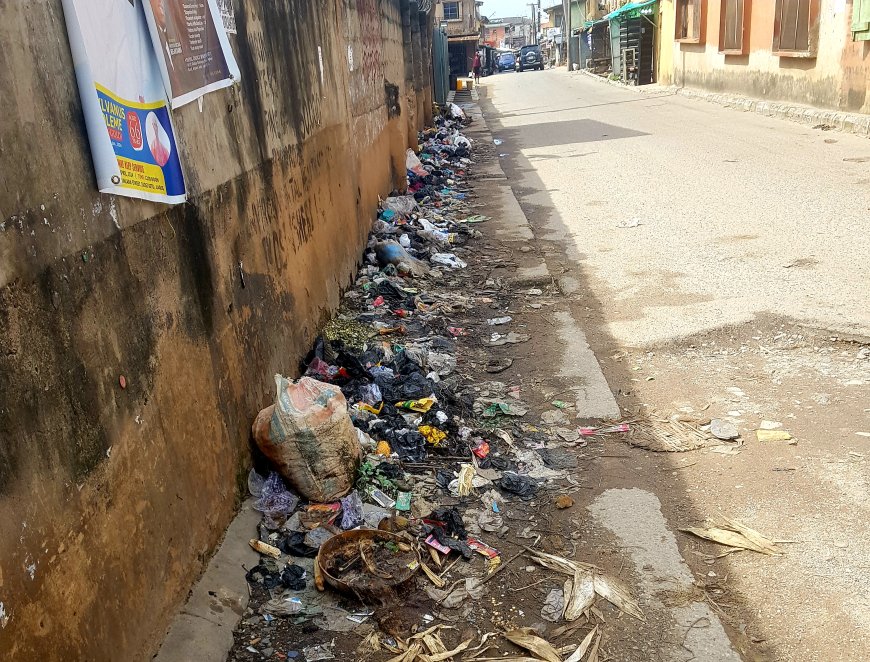 Residents dump waste on the street, which ends up being washed off by flooding to water sources in Oladele Street, Ketu, Lagos State, Nigeria. PC: Collins Ojiehanor
Residents dump waste on the street, which ends up being washed off by flooding to water sources in Oladele Street, Ketu, Lagos State, Nigeria. PC: Collins Ojiehanor
From densely populated slums to middle-income neighbourhoods, the link between hygiene and health is evident. But despite its importance, proper hygiene remains a neglected cornerstone by many residents in Lagos' battle against infectious diseases like cholera, typhoid, and diarrhea.
“Hygiene is health,” says Mrs. Faith Olatunji. “It’s the simplest, most effective way to protect ourselves and each other from disease,” she added.
Unmasking the Hygiene Crisis
Each year, about 1.8 million children under the age of five die from diarrheal diseases and pneumonia, the top two killers of young children globally. According to the Centers for Disease Control and Prevention (CDC), handwashing with soap could protect about 1 in 3 children who suffer from diarrhea and nearly 1 in 5 children with respiratory infections like pneumonia. Yet, in Lagos, poor hygiene practices and inadequate sanitation continue to put millions, especially children, at risk.
Mr. Chukwuma Eze, a resident of Alapere Ketu, highlighted the dire impact of careless waste disposal in his neighbourhood. "Hygiene is a serious problem in Lagos. I see people dumping refuse on the roadside or into gutters daily, especially when it rains. They think the water will wash everything away, but where does it go? It clogs the drainage system and floods the streets, carrying all that waste into other parts of the community," he said.
During the last rainy season, Eze recounted how his street, Oyebanjo Street, was one of many in Alapere-Ketu that experienced severe flooding due to blocked drainage systems. "The stagnant water became a breeding ground for mosquitoes, and my daughter caught malaria twice in two months. This is what happens when people don’t think beyond their immediate convenience," he lamented.
Eze believes that raising awareness about the collective impact of poor hygiene and enforcing stricter penalties for indiscriminate waste disposal could help address the problem. "People should understand that poor hygiene doesn’t just hurt them; it creates problems for everyone," he added.
In Lagos' markets, where fresh produce and street food attract millions daily, the lack of hygiene standards poses a severe threat to public health. Vendors often handle food without proper sanitation, and waste from stalls accumulates throughout the day, creating unsanitary conditions.
Dr. Bukola Adeyemi, a nutritionist, highlighted the serious health risks associated with poor hygiene practices when handling food. She explained that improper food handling and environmental hygiene can lead to severe consequences such as foodborne diseases and cross-contamination.
"Handling raw food without proper hygiene practices can result in foodborne diseases, which can often lead to food poisoning," Adeyemi stated. "Food poisoning can cause persistent diarrhea, which in turn leads to dehydration. This is particularly dangerous for children, as severe dehydration can quickly become life-threatening if not managed. That’s why Oral Rehydration Solution (ORS) is often administered to help maintain electrolyte balance in their bodies."
Adeyemi also warned against the risks of cross-contamination when raw food is stored or prepared alongside ready-to-eat food. "Cross-contamination occurs due to the transfer of microorganisms from raw food to cooked or ready-to-eat meals. This can further exacerbate health issues like malnutrition," she noted.
She added, "When someone suffers from diarrhea caused by food poisoning, essential nutrients are flushed out of the body along with the toxins. This disrupts the body's nutritional balance and can have long-term health effects if not properly addressed."
Adeyemi emphasized the need for strict adherence to hygiene practices in food handling and preparation, as these measures can significantly reduce the risk of foodborne illnesses and their associated complications.
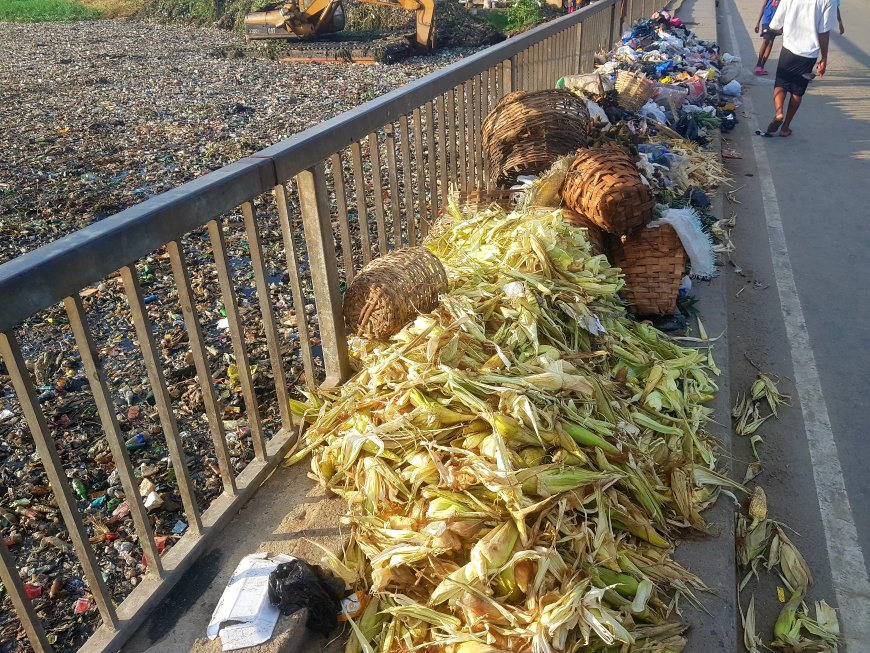 Residents dump waste indiscriminately on the walkway and inside canal in Alapere Estate. Lagos State, Nigeria. PC: Collins Ojiehanor
Residents dump waste indiscriminately on the walkway and inside canal in Alapere Estate. Lagos State, Nigeria. PC: Collins Ojiehanor
Mrs. Aishat Balogun, a regular shopper at Mile 12 markets, expressed her frustration. "I sometimes get discouraged to come to the market especially during the rainy season. Some people think it’s normal to leave garbage in the open market. They dump food waste, plastic bags, and even leftover fish water right where they stand. By the end of the day, the stench is unbearable, and the flies are everywhere," she said.
Balogun noted that the problem extends beyond the market itself, as waste carried away by rainwater flows into surrounding streets and neighbourhoods. "What makes it worse is that when it rains, all that waste flows into nearby streets. It’s not just the traders; it’s the customers and the people living around here who suffer," she explained.
Public Health at a Crossroads
For Ifeoma Ojo, a mother of three living in Alapere, the city’s waste and drainage issues are a daily nightmare. "The drainage is always blocked because people dump waste into it. During the rainy season, the water overflows and brings back all the dirt. It’s not just unpleasant; it’s dangerous for our health," she lamented.
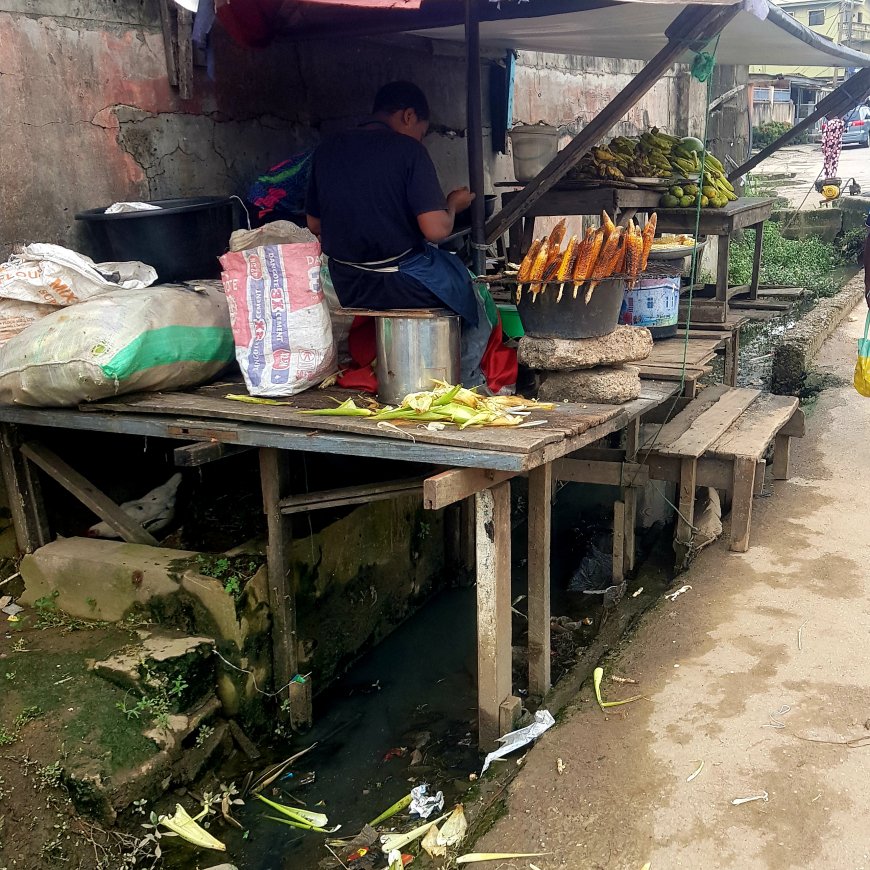 A vendor selling on top of an open drainage with exposure to contaminants in Ketu, Lagos State, Nigeria. PC: Collins Ojiehanor.
A vendor selling on top of an open drainage with exposure to contaminants in Ketu, Lagos State, Nigeria. PC: Collins Ojiehanor.
In Ojota, Samuel Adeyemi, a tricycle rider, echoed similar frustrations. "Even if I keep my place clean, it doesn’t matter because if the streets are dirty and waste is piling up, flies and rats can carry diseases from these places, and we all end up suffering. It's a public problem that affects everyone, no matter where you live," he said.
Samuel further stressed that while government policies are important, individuals and communities must also take responsibility. "Simple steps like regular handwashing, keeping surroundings clean, and participating in clean-up exercises can make a difference," he noted.
He pointed out that market clean-up days are often ignored by some traders, leading to stricter enforcement by environmental health officials. "Thursday is usually market clean-up day, but some traders stay at home until after 10 a.m., waiting for the exercise to end before opening their shops. That’s why you often see environmental officials shutting down shops," he added.
Lagos was one of the states hardest hit by the recent cholera outbreak. In response, the Lagos State Government launched several measures, including contact tracing, water sample testing, and public health campaigns to curb the disease’s spread.
Health authorities confirmed the presence of Vibrio cholerae, the bacterium responsible for cholera in water samples collected. They explained that the specific strain, subtype O1, is highly contagious and known for causing severe illness.
The outbreak highlighted the ripple effects of poor sanitation and hygiene practices. Overflowing waste bins, open defecation, and contaminated water sources are common, exposing residents to health risks such as cholera, diarrhea, and typhoid fever. These risks, however, extend beyond the immediate neighbourhoods, threatening public health citywide.
The High Cost of Poor Hygiene
The economic and social costs of neglecting hygiene are overwhelming. Illnesses linked to poor hygiene practices can lead to significant losses in productivity, increased healthcare expenses, and reduced quality of life for affected families.
Poor hygiene exacerbates the burden on public health facilities, which are already stretched thin. The rising demand for medical care due to preventable diseases like typhoid, and respiratory infections diverts resources from other critical health priorities. This strains the state's capacity to deliver effective healthcare, compounding the challenges faced by an overpopulated urban center like Lagos.
Moreover, the indirect costs such as lost workdays, reduced educational opportunities for children affected by illness, and long-term health complications, further hinder economic growth and development.
During the Lagos CLEAN-Air Forum 2024, the Lagos State Commissioner for Health, Prof. Akin Abayomi, during his address, painted a grim picture of the challenges facing the state's healthcare sector. "We are currently facing a significant shortfall of approximately 30,000 medical doctors in Lagos, which is necessary to meet the healthcare demands of our population," Abayomi revealed.
The Lagos State Waste Management Authority (LAWMA) collect thousands of tons of waste daily. According to a report by the Nigerian Institute of Town Planners (NITP), Lagos generates an estimated 13,000 to 15,000 metric tonnes of waste daily. Yet, a substantial portion of this waste ends up in open dumpsites due to improper disposal practices and reliance on informal waste collectors. These unmanaged open dumpsites leach harmful substances into the soil and water, further complicating the city’s sanitation crisis.
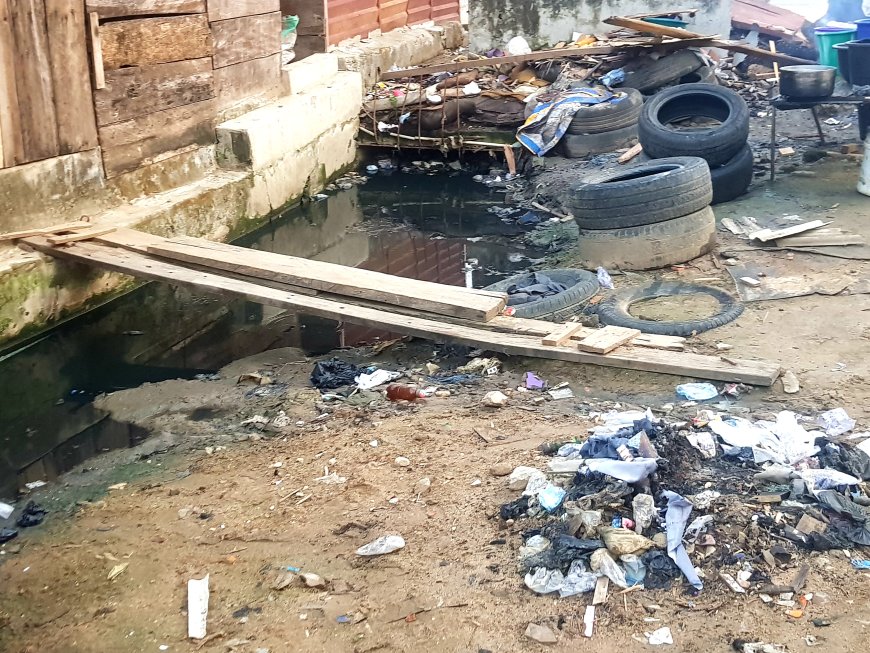 Unhygienic environment with stagnant water in Wesley street, Alapere, Lagos State, Nigeria. PC: Collins Ojiehanor
Unhygienic environment with stagnant water in Wesley street, Alapere, Lagos State, Nigeria. PC: Collins Ojiehanor
Nurse and Paramedic expert, Bukola Christiana Okusanya, shed light on the severe health consequences of poor personal and environmental hygiene. She emphasized the importance of maintaining hygiene to avoid a range of infections and illnesses.
"Not engaging in proper personal hygiene can lead to various health issues, some of which are quite severe," Okusanya explained. "For instance, neglecting proper personal hygiene can result in skin infections such as acne, boils, and eczema. These conditions can worsen if proper care is not taken."
Okusanya further noted that poor hygiene practices can also cause respiratory problems. "Some individuals touch contaminated surfaces and fail to wash their hands before eating, which increases their risk of developing respiratory issues. This can lead to conditions like the common cold, flu, or even pneumonia," she said.
She also highlighted the risk of gastrointestinal issues linked to poor hygiene. "Inadequate hygiene practices can result in gastrointestinal problems such as stomach cramps, pain, vomiting, and diarrhea. These issues are often caused by the ingestion of harmful bacteria or viruses that could have been prevented with proper handwashing," she explained.
Okusanya additionally warned about the dangers of eye infections. "Failing to maintain proper hygiene can as well result in eye infections, which may cause discomfort and, in severe cases, lead to vision problems," she said.
Highlighting the severe health consequences of neglecting environmental hygiene, she pointed out that poor environmental practices can contribute to the spread of various diseases and with serious health consequences.
"Failing to maintain environmental hygiene can have dire consequences," Okusanya explained. "For instance, stagnant water or improper waste management can attract vectors like mosquitoes. When these mosquitoes bite, they can transmit diseases such as malaria and fever."
She also emphasized the dangers of consuming contaminated water. "When water is not properly treated or is exposed to contamination, it can lead to waterborne diseases like cholera or typhoid fever. These diseases are especially dangerous and can escalate quickly if not addressed," she said.
Okusanya further discussed the impact of air pollution on respiratory health. "Air pollution poses a serious threat, particularly when harmful particles or substances are released into the air. Inhaling polluted air can lead to respiratory issues such as asthma or chronic obstructive pulmonary disease (COPD). These are serious conditions that can significantly affect an individual's quality of life," she explained.
"Keeping our surroundings clean and maintaining environmental hygiene is just as important as personal hygiene when it comes to protecting public health," she stated.
A Vision for a Cleaner Lagos
The Lagos State Government, through its Ministry of the Environment and Water Resources (MOE&WR), alongside key agencies like the Lagos State Environmental Protection Agency (LASEPA), the Lagos Water Corporation (LWC), and the Lagos Waste Management Authority (LAWMA), has intensified efforts to address contamination, waste management, and other environmental challenges threatening public health.
Various departments, including the Lagos State Environmental Task Force, the Emergency Flood Abatement Gang (EFAG), the Lagos State Waste Water Management Office (LSWMO), the Drainage Enforcement and Compliance Department, the Lagos State Environmental Sanitation Corps (LAGESC), and the Lagos State Environmental and Special Offence Task Force, have undertaken targeted initiatives to uphold sustainable environmental practices, improve sanitation, and safeguard public health.
These agencies have been at the forefront of operations such as sealing off residential buildings, shops, and restaurants that flout sanitation standards; conducting clean-up and sensitization exercises on the dangers of open defecation; and raiding sites harboring illegal squatters, street traders, and hawkers. Additionally, they have dislodged miscreants from under bridges, removed shanties and illegal structures from drainage channels and setbacks, and worked tirelessly to clear waterways across the state.
In November 2024, the Lagos State Commissioner for Environment and Water Resources, Tokunbo Wahab, on his official X handle @tokunbo_wahab, outlined some of the government’s forward-looking strategies to create a cleaner, more sustainable city.
He shared that as part of the state’s efforts, Lagos is collaborating with the Swedish government on a pioneering project to convert liquid and abattoir waste into biogas. He emphasized the importance of stricter regulations targeting producers and sellers. Measures include the ban on non-biodegradable materials like styrofoam, with additional plans to restrict single-use plastics.
He also highlighted that Lagos is establishing a joint fund, co-managed by public and private entities, to incentivize recycling. The initiative will particularly focus on recycling pure water sachets, aiming to reduce the widespread litter caused by this common packaging material.
To further enhance waste management, the government plans to decommission the Olusosun and Igando dumpsites within the next 24 months. The transition will involve private sector partnerships to ensure efficient and environmentally friendly waste disposal systems.
Non-governmental organizations (NGOs) have complemented government efforts through public health campaigns, educating residents on the importance of hygiene and proper waste disposal. However, behavioural change remains a significant hurdle. Many residents continue to underestimate the impact of poor hygiene on their health and environment.
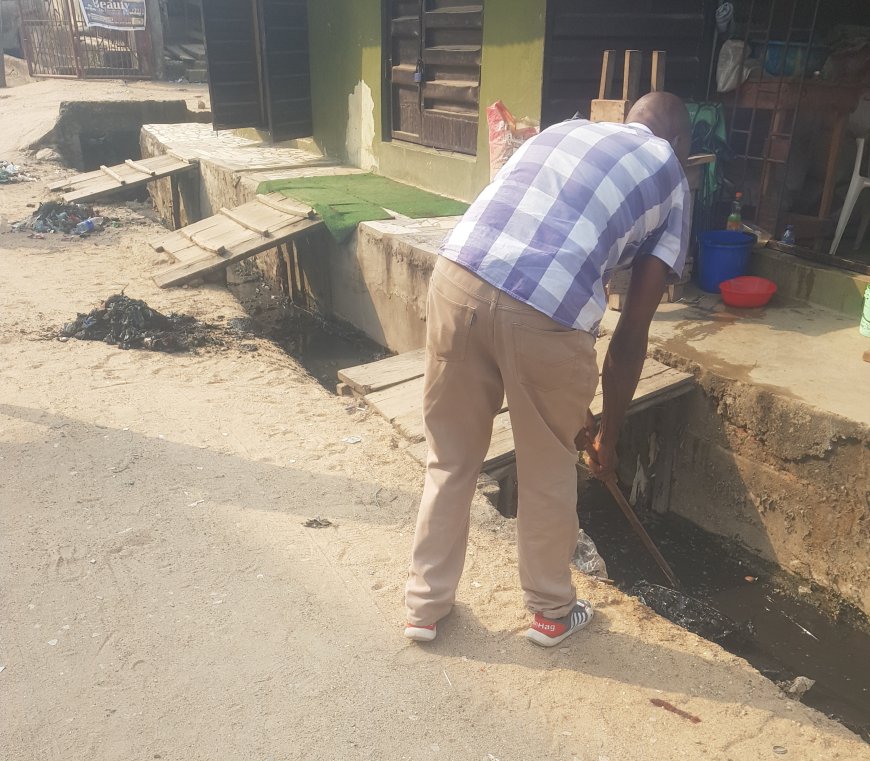 A resident engaging in cleanup of gutter blocked with plastic and other waste in Ibefun street. Lagos State, Nigeria. PC: Collins Ojiehanor
A resident engaging in cleanup of gutter blocked with plastic and other waste in Ibefun street. Lagos State, Nigeria. PC: Collins Ojiehanor
Solutions Within Reach?
Addressing Lagos' hygiene and sanitation crisis requires a comprehensive approach involving government action, community involvement, and individual responsibility. Health and environmental experts identified key strategies to create lasting change and improve public health outcomes.
Government interventions are central to addressing the crisis. Experts recommend expanding access to clean water supply systems, particularly in underserved and informal settlements, while investing in modern waste management infrastructure, such as recycling plants and environmentally friendly landfill sites. The construction of public toilets in markets, bus terminals, and high-traffic areas is also vital to curbing open defecation.
Stronger policy enforcement is needed to regulate food safety, sanitation, and waste disposal practices. Implementing strict penalties for individuals and businesses engaging in improper waste management or environmental violations could deter such practices. Increased public health funding is also critical. Experts call for more resources to support hygiene education, health awareness campaigns, and disease prevention programs, as well as equipping public health facilities to combat sanitation-related illnesses effectively.
Community-driven initiatives can also play a transformative role. Organizing regular neighborhood clean-up campaigns led by local leaders and residents can help maintain clean streets, markets, and drainage systems. Collaborating with community associations and NGOs to provide resources for clean-up activities can amplify these efforts.
Educational programs that teach residents practical hygiene habits, such as proper handwashing, waste sorting, and safe food handling, can significantly improve sanitation practices. Leveraging local media and influencers to raise awareness about the dangers of poor hygiene is another effective strategy.
Grassroots organizations can advocate for better sanitation infrastructure by lobbying the government for clean water systems, waste bins, and public restrooms. Encouraging community participation in decision-making processes ensures that solutions are tailored to meet local needs.
At the individual level, practicing good hygiene remains fundamental. Regular handwashing with soap and water, especially before eating or cooking and after using the restroom, can reduce the risk of infections. Parents are encouraged to teach their children the importance of cleanliness to instill lifelong habits. Ensuring proper food handling, such as washing fruits and vegetables thoroughly and storing food in clean, covered containers, can prevent contamination.
Additionally, individuals must dispose of waste responsibly by using designated waste bins, recycling materials when possible, and refraining from dumping refuse into drainage systems or water bodies.
Experts agree that tackling Lagos' sanitation crisis requires collective effort and commitment from all stakeholders. By implementing these measures, the city can make significant progress toward a healthier and cleaner environment.
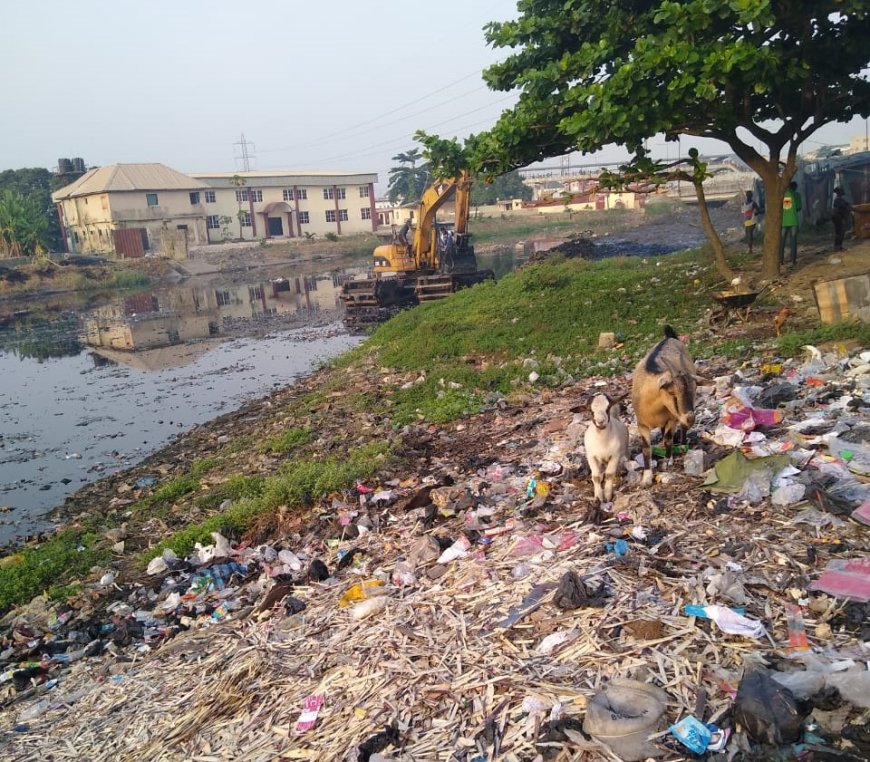
The operatives of the Drainage Maintenance Department under the Lagos State Ministry of Environment and Water Resources (MOE&WR) involved in cleaning and evacuating drainage channels in Apapa Local Government Area, Lagos State, Nigeria. (Source: MOE&WR)
A Shared Responsibility
Promoting hygiene and sanitation in Lagos is a shared duty that extends beyond individuals to the entire community and government. A single lapse such as improper waste disposal or lack of handwashing, can lead to widespread health challenges like cholera outbreaks, malaria, and respiratory illnesses.
In a densely populated city like Lagos, interconnectedness means that personal choices affect public health outcomes. As Mrs. Aishat Balogun aptly put it, "Hygiene is everyone’s business." Only through collaborative efforts backed by robust policies, community participation, and individual commitment can Lagos achieve its vision of becoming a cleaner, healthier, and more livable city.
The time to act is now. A cleaner Lagos is within reach, but it requires every stakeholder to take responsibility and work together for a sustainable future.
Source: Collins Odigie Ojiehanor/ Lead News Online
The author is an Health and Environmental Reporter based in Lagos, Nigeria
























































